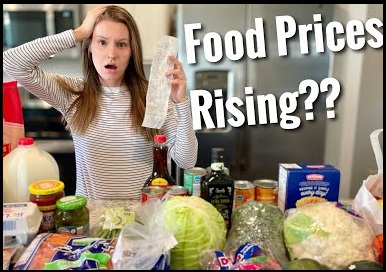The Albertsons and Kroger Merger Faces Legislative Scrutiny as European Company Ahold Assembles Competitive Bid

Last week we discussed the announcement of a $24.6 billion merger deal between Kroger and Albertsons supermarkets {Go Deep}. The majority stockholders in both companies are institutional investment groups, Blackrock, Vanguard and Cerberus.
 The merger would consolidate the second and third largest food retailers in the U.S. and would certainly dilute the competitive dynamic amid the supermarket industry. Concern over price controls and decreased competition has now arrived on the desks of DC legislators who are reviewing the deal.
The merger would consolidate the second and third largest food retailers in the U.S. and would certainly dilute the competitive dynamic amid the supermarket industry. Concern over price controls and decreased competition has now arrived on the desks of DC legislators who are reviewing the deal.
(Reuters) – […] U.S. Democratic Senator Amy Klobuchar and Republican Senator Mike Lee were quick to say that they would hold a hearing to discuss the merger. A European interloper could make deal plans even harder.
Frans Muller, Chief Executive of Stop & Shop owner Ahold Delhaize (AD.AS), has made no secret of his desire to consolidate U.S. grocers. The Netherlands-based firm is already the fourth largest grocery chain. If it managed to cobble together a better offer than Kroger’s bid for Albertsons, it would become the second largest supermarket. Plane spotters tracked two Albertsons jets next to Ahold Delhaize’s U.S. base in Massachusetts in early August. Ahold declined to comment.
Ahold can also afford a chunky deal. The Dutch grocer has debt of just 2 times its $6.7 billion of EBITDA estimated for this year, according to Refinitiv. That’s 50% less than the average. If investors reckoned there was merit in a deal, Muller could also use equity to beef up the offer. At more than 12 times, Ahold’s price-to-earnings ratio is a fifth higher than Albertsons’, giving it currency.
Aspects of the deal might make it easier for antitrust authorities to get comfortable, too. Kroger and Albertsons would have a combined market share of 13%, whereas a deal with its Dutch rival gives much less of the pie. Ahold focuses on the East Coast of America whereas Albertsons has a big presence on the West Coast. So regulators wouldn’t have to worry about a larger Kroger shutting down competing Albertsons stores.
[…] U.S. senators who scrutinise antitrust issues expressed “serious concerns” about grocery company Kroger’s plan to buy rival Albertsons, and said they would hold a hearing in November on the $25 billion deal.
The announcement by Democratic Senator Amy Klobuchar, chair of the Senate Judiciary Committee antitrust panel, and Republican Senator Mike Lee confirmed a previous report by Reuters.
A Kroger spokesperson said the company looked forward to the hearing. “We welcome the opportunity to outline how this transaction will benefit America’s consumers by expanding access to fresh, affordable food,” the company said in a statement.
The Federal Trade Commission is expected to review the deal to ensure it complies with antitrust law. (read more)
This might be one of those rare times when a legislative and regulatory review may actually be beneficial to the outcome for the consumer.

December 16, 2020, Dozen Large Eggs $1.79
October 11, 2022, Dozen Large Eggs $7.29
(Source)
(DCBusinessDaily) – […] Scott Rasmussen Number of the Day shows 76% of voters have seen their grocery prices go up in the last month. The poll also found 60% of voters believe prices will continue to rise. Additionally, 54% of voters say gas prices have gone up in the last month and 59% believe gas prices will continue to go up. Ballotpedia’s poll methodology surveyed 1,200 registered voters from Oct. 6-8. According to the Ballotpedia website, the poll was lightly weighted by geography, gender, age, race, education, internet usage and political party to reflect a fair balance of voters across the country. The margin of sampling error is +/- 2.8 percentage points.
The U.S. Bureau of Labor Statistics issued its latest Consumer Price Index (CPI) summary for the nation on Oct. 13, which found that the rate of inflation over the last 12 months stands at 8.2%. It rose 0.4% in September. In the last year, food costs have risen by 11.2%, energy costs have increased by 19.8%, gas prices have risen by 18.2% and the cost to purchase a new vehicle has increased by 9.4%. (more)




Post a Comment